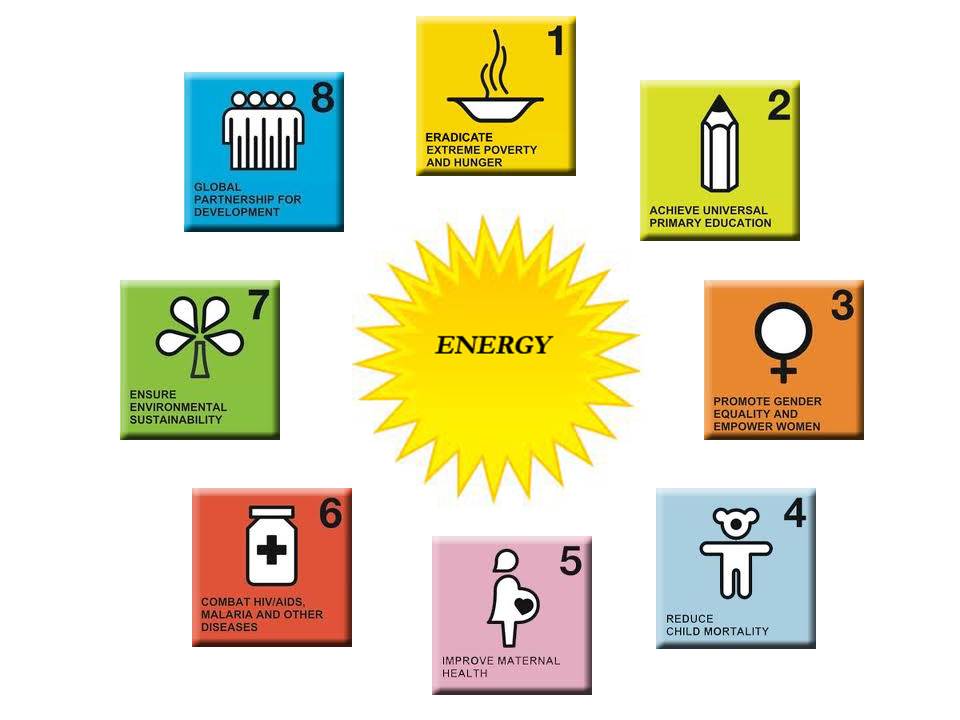In September 2000, world leaders came together at the United Nations Headquarters in New York to adopt the United Nations Millennium Declaration, committing their nations to a new global partnership to reduce extreme poverty and establishing a series of time-bound targets—with a deadline of 2015—that have become known as the Millennium Development Goals, or “MDGs” for short.
The Millennium Development Goals, which all 192 United Nation member states and at least 23 international organizations have signed on to, include 1) eradicating extreme poverty and hunger; 2) achieving universal primary education; 3) promoting gender equality and empowering women; 4) reducing child mortality; 5) improving maternal health; 6) combating HIV/AIDS, malaria, and other diseases; 7) ensuring environmental sustainability; and 8) building a global partnership for development.
When the Millennium Development Goals were first announced 10 years ago, I was surprised and disappointed to learn that energy access had not been included by the U.N. as one of the MDGs. For without access to modern energy services, none of the MDGs are ultimately achievable. However, in the past few years, a growing number of institutions, including the United Nations itself and the International Energy Agency, have come to acknowledge and promote the fundamental importance of modern energy in meeting all of the Millennium Development Goals.
So how exactly does energy relate to the MDGs? Let us take a closer look. For each of the Millennium Development Goals, I have provided an example or two of the role that energy access can play in fulfilling that goal. Please bear in mind that the list of examples included here is by no means exhaustive.
Eradicate extreme poverty and hunger

- Household lighting extends the productive work day.
- Electricity facilitates the establishment of village-based micro-enterprises.
- Energy for irrigation increases food production and access to nutrition.
Achieve universal primary education

- Household lighting enables children to read and study at night.
- Energy services reduce time spent by school-going children on basic survival activities, such as fetching water and firewood.
- Electricity enables the use of educational media, computers, and internet access in schools.
Promote gender equality and empower women

- Modern energy services free women from extreme household drudgery, increase their employment opportunities, and allow them to participate more fully in community activities.
- Energy access reduces girls’ burden to collect water and fuel, increasing their school enrollment.
Reduce child mortality

- Energy is a prerequisite for a functional health system, contributing, for example, to lighting operating theaters, refrigerating vaccines, sterilizing equipment, and providing communications.
- Energy for water pumping and purification greatly reduces the risk of water borne diseases.
Improve maternal health

- Besides its centrality to the healthcare system, modern energy can lower maternal mortality by reducing the level of indoor air pollution, which kills 1.6 million people every year.
Combat HIV/AIDS, malaria, and other diseases

- Modern energy services for power and communications in rural clinics and hospitals enable a quantum leap in health services.
Ensure environmental sustainability

- Access to renewable energy technologies helps to preserve natural resources and lowers emissions, which helps protect the local and global environment.
Build a global partnership for development

- The global north can help achieve the MDGs by providing increased access to renewable energy technologies and finance to the least developed countries.
As a 10-year progress report on the Millennium Development Goals was presented at the United Nations during its general assembly in September of this year, Secretary-General Ban Ki-moon hosted a dinner at the UN to kickstart an awareness campaign around the need for universal energy access. I was delighted to be present at this dinner, and to see the growing consensus among world leaders that unless and until we find a way to sustainably deliver modern energy services to the quarter of humanity still living without electricity, we will never fully achieve the MDGs.
